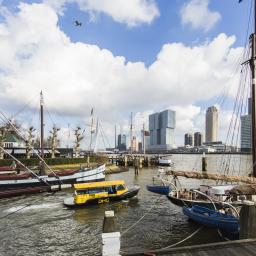The population of people in cities is growing fast in the Netherlands. Zuid-Holland specifically, with its 3.7 million inhabitants, is the most densely populated area of the country. In 2016, the Dutch government set the ambition for the economy to be circular by 2050. The underlying goal is to ensure that there will be sufficient resources for current and future generations. This ambition, set by the government has made circular city development increasingly important. What is circular city development and what do we need to make this possible?
Circularity is a system that aims at the continual use of resources and eliminating waste. In the past two years, the LDE Centre for Sustainability researched circular urban development as part of an ACCEZ research project. The neighbourhood Binckhorst Noord West, in The Hague, served as a case study to develop both academic insights and practical requirements for circular city development. The aim was to develop this area into a neighbourhood where living, working and industry come together. The Binckhorst area is part of the Central Innovation District in The Hague.

We spoke to two researchers who were part of this project to find out more about their main insights; Ellen van Bueren, professor of Urban Development Management (Architecture, TU Delft), and principal investigator in the Binckhorst project. And, Teun Verhagen, a 3rd year PhD Researcher who was involved in analyzing the material stocks and flows in the area.
Beyond boundaries

Circular City Development proves to be a complex topic in the practice. Van Bueren explains that when we talk about circular city development it results in us drawing boundaries around a city, area or even region. However, these boundaries can be arbitrary. While a city can be marked as circular, the actual impact that is created, on a larger scale, as a consequence of the city (re)development can be much larger.

Verhagen proposes to focus on minimizing the impact that emerges as a consequence of city (re)development while also looking at the role of a city or area plays on a larger scale. Within his research, Teun encountered multiple trade-offs, such as when he looked at whether to move the waste disposal company, Haagse Milieu Service, in or out of the Binckhorst area.
While having companies in the area ensures less transport movement of all the waste trucks, moving the company out of the area could create a better living environment. ‘circular city development is broader than one specific city or area’. It requires an analysis of what happens to the area around it.

A complex issue
The complexity of circular city development was reflected as well in the five main themes the research project addressed: governance, closing resource loops, business models and citizen participation and community building. The case showed that when (re)developing cities with circularity in mind, it is essential to look at the different perspectives and the underlying values of each of the stakeholders involved. These perspectives influence the choices made when it comes to circular city development.
So, what do we need to realize circular city development? Next to (local) government(s) developing more stimulating policy and setting new recycling standards, the bottom-up participation from companies and citizens helps grow the support base for this intricate yet much-needed development.
ACCEZ: Accelerating Circular Economy Zuid-Holland. ACCEZ is a knowledge and innovation program financed by the Provincie Zuid Holland. The program aims to accelerate the transition towards a circular economy in the region of Zuid-Holland by providing concrete answers to complex problems.
The Binckhorst project involved the municipality of the Hague, (social) entrepreneurs in the area united in I’M BINCK, Cirkelstad, PEP Den Haag, BAM, Haagse Milieu Service, Gered Gereedschap and citizens in the area. Next, to the Leiden-Delft-Erasmus Universities Wageningen University and Research was involved.





